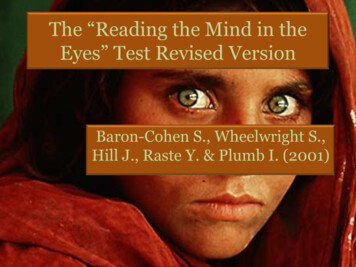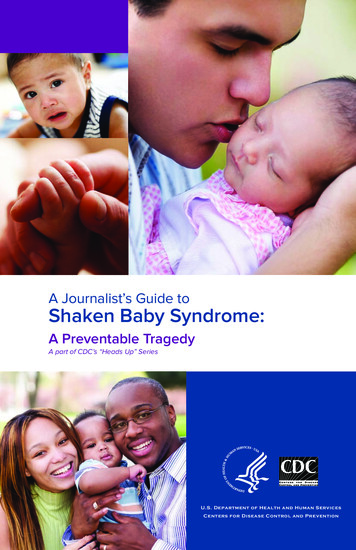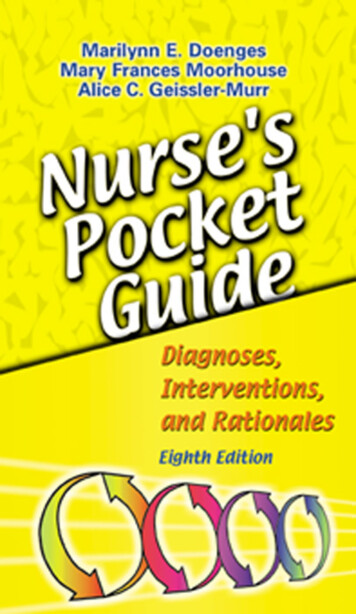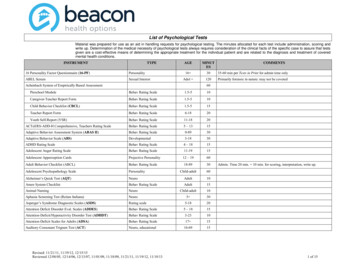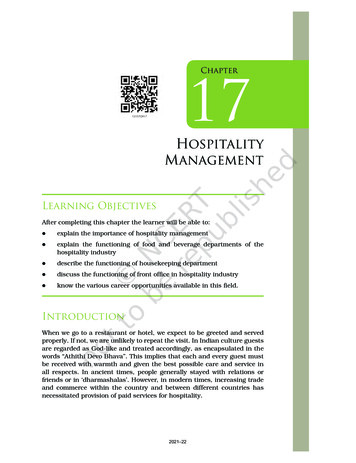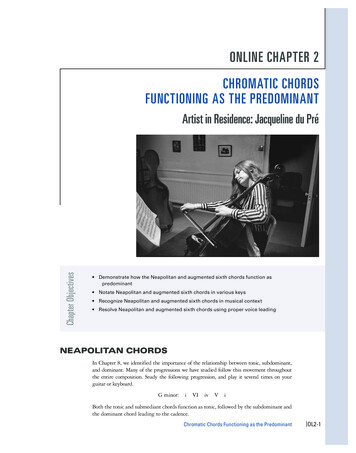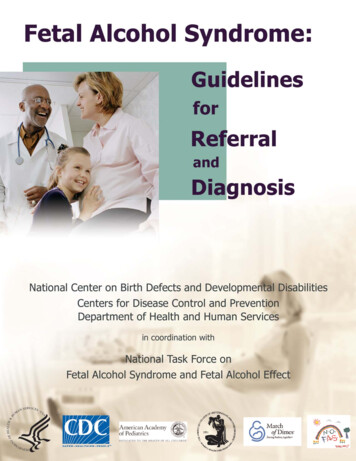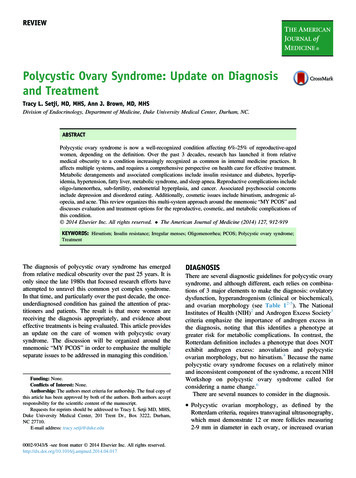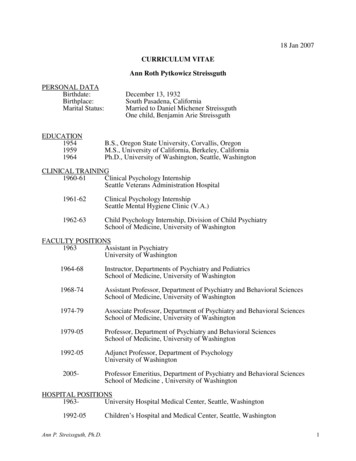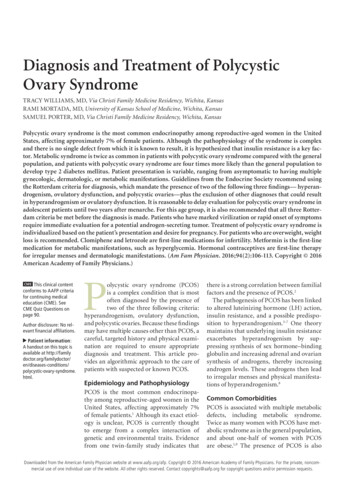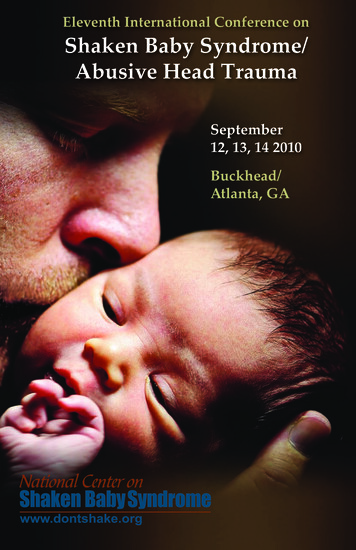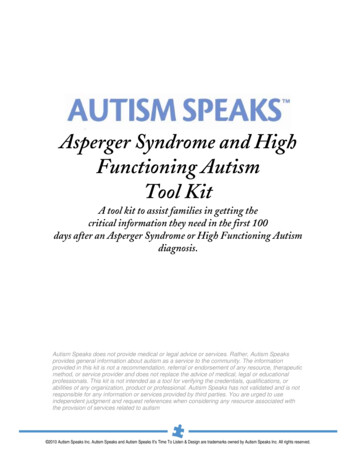
Transcription
Asperger Syndrome and HighFunctioning AutismTool KitA tool kit to assist families in getting thecritical information they need in the first 100days after an Asperger Syndrome or High Functioning Autismdiagnosis.Autism Speaks does not provide medical or legal advice or services. Rather, Autism Speaksprovides general information about autism as a service to the community. The informationprovided in this kit is not a recommendation, referral or endorsement of any resource, therapeuticmethod, or service provider and does not replace the advice of medical, legal or educationalprofessionals. This kit is not intended as a tool for verifying the credentials, qualifications, orabilities of any organization, product or professional. Autism Speaks has not validated and is notresponsible for any information or services provided by third parties. You are urged to useindependent judgment and request references when considering any resource associated withthe provision of services related to autism 2010 Autism Speaks Inc. Autism Speaks and Autism Speaks It’s Time To Listen & Design are trademarks owned by Autism Speaks Inc. All rights reserved.
About this KitAutism Speaks would like to extend special thanks to the Advisory Committee forthe time and effort that they put into reviewing the Asperger Syndrome andHigh Functioning Autism Tool Kit.Asperger Syndrome and High Functioning Autism Tool KitAdvisory CommitteeAnn BrendelGeraldine Dawson, Ph.D.Chief Science Officer, Autism SpeaksResearch Professor, University of North Carolina, Chapel HillPeter F. Gerhardt, Ed.D.President, Organization for Autism Research (OAR)Kerry MagroValerie Paradiz, PhDPatricia R Schissel, LMSWPresident, Asperger Syndrome and High Functioning Autism Association (AHA), Inc.Stephen M. Shore, Ed.DAssistant Professor of EducationAdelphi UniversityFamily Services Committee MembersLiz BellParentSallie BernardParent, Executive Director, SafeMindsMichele Pierce BurnsParentFarah ChapesChief Administrative Officer, The Marcus Autism Center 2010 Autism Speaks Inc. Autism Speaks and Autism Speaks It’s Time To Listen & Design are trademarks owned by Autism Speaks Inc. All rights reserved.
Peter F. Gerhardt, Ed.DPresident, Organization for Autism Research (OAR)T. Michael Glenn*ParentSusan Hyman, M.D.Strong Center for Developmental DisabilitiesBrian Kelly * **ParentArtie Kempner*ParentGary S. Mayerson*Founding Attorney, Mayerson & AssociatesKevin Murray*ParentLinda Meyer, Ed.DExecutive Director, Autism New JerseyDenise D. ResnikParent, Co-Founder Southwest Autism Research and Resource Center (SARRC)Stuart SavitzParentMichelle SmigelParentKim WolfParent*Autism Speaks board member**Chairperson – Family Services CommitteeParent – indicates a parent of a child with autism 2010 Autism Speaks Inc. Autism Speaks and Autism Speaks It’s Time To Listen & Design are trademarks owned by Autism Speaks Inc. All rights reserved.
Autism Speaks. Asperger Syndromeand High Functioning Autism Tool KitIntroduction, Symptoms and CausesWhat is Asperger Syndrome/HFA?.Page 2What are the Symptoms of Asperger Syndrome/HFA .Pages 2,3,4What Causes Asperger Syndrome/HFA?.Page 4List of Strengths and ChallengesStrengths and Challenges Chart .Page 5Executive Functioning and Theory of MindExecutive Functioning and Theory of Mind .Page 6,7Diagnostic OverviewDSM-IV Criteria .Page 8Diagnosing Asperger Syndrome/HFA . Page 9How are AS and HFA Different?How Asperger Syndrome is Similar to Classic Autism .Page 10How do AS/HFA Diagnoses differ from Classic Autism .Page 10You, Your Family and AS/HFAHow will I deal with the Diagnosis? How will this Affect My Family?.Page 11Explaining the Diagnosis to Your Child . Page 12Telling Family Members .Page 12Telling Others .Page 13Telling Peers Pages 13, 14Join a Support Group .Page 14Treatment and Interventions for AS/HFAInterventions Overview .Page 15Parent Education and Training Page 16Cognitive Behavior Therapy .Page 17Applied Behavior Analysis . .Page 17Sensory Integration/Occupational Therapy . Page 18Medication .Page 18 2010 Autism Speaks Inc. Autism Speaks and Autism Speaks It’s Time To Listen & Design are trademarks owned by Autism Speaks Inc. All rights reserved.
AS/HFA and the ClassroomAccessing Services: Your Child’s Right to Public Education .Page 19Six Step Plan .Page 20Transition into AdulthoodTransition to Adulthood Overview . Pages 23,24ResourcesResource List Pages 25, 26, 27Safety KitUseful FormsUseful Books and WebsitesYour Local Resources 2010 Autism Speaks Inc. Autism Speaks and Autism Speaks It’s Time To Listen & Design are trademarks owned by Autism Speaks Inc. All rights reserved.
Your child has normal cognitive abilities and has experienced normal languagedevelopment, but has been diagnosed with Asperger Syndrome or HighFunctioning Autism, and you have asked for help. This is an important turningpoint in your journey. For some families, this may be the point when, after a longsearch for answers, you now have a name for something you didn’t know what tocall, but you knew existed. Many families report mixed feelings of sadness andrelief when their child is diagnosed. You may feel completely overwhelmed. Youmay also feel relieved to know that the concerns you had for your child are valid.Whatever you feel, you should know that thousands of parents share this journey.You are not alone. There is help and reason to hope.Now that you have the diagnosis, the question is: Where do you go from here?This handbook, part of Autism Speaks 100 Day Kit, focuses specifically onAsperger Syndrome (AS) and High Functioning Autism (HFA). It was createdto help you make the best possible use of the next 100 days in the life of your child.It contains information and advice collected from trusted and respected experts onAsperger Syndrome /HFA and parents just like you.Contact Us.Ask for Help! Contact the Autism Response Team (ART). Our ART teammembers are specially trained to help families with the day-to-day challenges ofliving with Asperger Syndrome or High Functioning Autism. Contact ART forresources, support and information.Call us at 888-AUTISM 2 (288-4762) or email familyservices@autismspeaks.org.More information. There is a wealth of information on the Autism Speaks web site.Visit www.AutismSpeaks.orgShare your comments. To share your comments on the kit - What was helpful?What additional information could be included? etc. - please email them to100daykit@AutismSpeaks.org, with the word “feedback” in the subject line. 2010 Autism Speaks Inc. Autism Speaks and Autism Speaks It’s Time To Listen & Design are trademarks owned by Autism Speaks Inc. All rights reserved.
What is Asperger Syndrome/HFA?The National Institute of Neurological Disorders and Stroke (NINDS), part of theNational Institute of Health, defines Asperger Syndrome as:A developmental disorder that is characterized by: repetitive routines or rituals, peculiarities in speech and language, such as speaking in an overlyformal manner or in a monotone, or taking figures of speech literally, socially and emotionally inappropriate behavior and the inability to interactsuccessfully with peers, problems with non-verbal communication, including the restricted use ofgestures, limited or inappropriate facial expressions or a peculiar, stiffgaze, clumsiness and uncoordinated motor movements.Below is the NINDS history of Asperger Syndrome, which we hope will help you tounderstand more about the disorder and what the diagnosis means for your child andyour family:In 1944, an Austrian pediatrician named Hans Asperger observed four children in hispractice who had difficulty integrating socially. Although their intelligence appearednormal, the children lacked nonverbal communication skills, failed to demonstrateempathy with their peers, and were physically clumsy. Their way of speaking was eitherdisjointed or overly formal, and their all-absorbing interest in a single topic dominatedtheir conversations.Asperger’s observations, published in German, were not widely known until 1981, whenan English doctor named Lorna Wing published a series of case studies of childrenshowing similar symptoms, which she called “Asperger” syndrome. Wing’s writings werewidely published and popularized. AS became a distinct condition and diagnosis in1992, when it was included in the tenth published edition of the World HealthOrganization’s diagnostic manual, International Classification of Diseases (ICD-10), andin 1994, it was added to the fourth edition of the Diagnostic and Statistical Manual ofMental Disorders (DSM-IV), the American Psychiatric Association’s diagnostic referencebook.Individuals who are diagnosed with autism or autism spectrum disorder who havenormal cognitive abilities, and experienced no significant delay in acquiring languageskills, are very similar to individuals with Asperger Syndrome. High Functioning AutismSpectrum Disorder (HFA) and Asperger Syndrome share similar symptoms and arehelped by similar treatment approaches.What are the Symptoms of Asperger Syndrome/HFA?Oftentimes, Asperger Syndrome is not diagnosed until a child is school age. Unlikeautism, AS can generally only be determined based on a child’s social interactions.Children with Asperger Syndrome show typical language development and often anabove average vocabulary. However, you may have noticed that when your childinteracts with others, he or she might use language skills inappropriately or awkwardly.Because of regularly developing language skills, in the early stages, symptoms of ASmay be hard to differentiate from those of other behavioral issues like attention deficit2 2010 Autism Speaks Inc. Autism Speaks and Autism Speaks It’s Time To Listen & Design are trademarks owned by Autism Speaks Inc. All rights reserved.
hyperactivity disorder (ADHD). As a result, your child may have first been diagnosedwith disorders such as ADHD, until the issues appear to be caused by more of aninability to socialize than an inability to focus.The following is a list of symptoms that may present themselves in children withAsperger Syndrome: improper or very few social interactions"robotic" or repetitive speechaverage or below average nonverbal communication skills, yet average or aboveaverage verbal communication skillstendency to discuss self rather than othersinability to understand issues or phrases that are considered “common sense”lack of eye contact or reciprocal conversationobsession with specific unique topicsone-sided conversationsawkward movements and/or mannerismsA very obvious and distinct indicator of Asperger Syndrome is preoccupation with oneparticular issue, from simple things like refrigerators or weather, to complex topics likePresident Franklin D. Roosevelt during the Great Depression. They become so attentiveto these topics that they strive to learn every possible fact and detail, and as a resultbecome incredible experts. Children with AS might initiate one-way conversations withothers by speaking only about the facts related to their particular topic of interest. Theymay not like the idea of discussing anything else, or may be unable to listen to andunderstand the responses of others. Your child may not be aware that his or heraudience may no longer be listening, or may not be in the topic of discussion.Another symptom of Asperger Syndrome is an inability to understand the actions, wordsor behaviors of other people. Individuals with AS very often don’t understand humor orthe implications of particular phrases or actions of other people. Subtle gestures orexpressions such as a smile, a frown or a “come here” motion may not phase childrenwith AS because they are unable to see the relationship between these nonverbalcommunication methods, and verbal methods like speech and language. Because theyare often incapable of understanding these nonverbal cutes, the social world can seemvery confusing and overwhelming to these individuals. To compound the problem,people with Asperger Syndrome have difficulty seeing things from another person’sperspective. This inability leaves them unable to predict or understand other people’sactions. Although not universal, it is common for people with AS to have difficultyregulating their emotions.Individuals with Asperger Syndrome may have an awkward or peculiar way of speaking.They might speak extremely loudly, constantly in a monotone, or with a particularaccent. These individuals lack understanding of social interactions, and as a result, areunaware that their topics of discussion or method of speaking might be inappropriate orawkward, particularly in specific situations. For example, children who speak very loudlymight enter a church and not understand that they can no longer speak at the samevolume.3 2010 Autism Speaks Inc. Autism Speaks and Autism Speaks It’s Time To Listen & Design are trademarks owned by Autism Speaks Inc. All rights reserved.
Another typical sign of Asperger Syndrome may be awkward movements, or a delay inmotor skills. They may have an abnormal walk or a poor sense of coordination. Thoughthese individuals might be very intelligent and might display expert language skills, theymay not be able to catch a ball or understand how to bounce on a trampoline, despitethe many attempts of others to teach them.It is important to note that not all individuals with Asperger Syndrome display each ofthese symptoms, and that the presence and severity of each symptom is likely to varybetween individuals with the same diagnosis. While displaying some or all of thesesymptoms, each child with autism also possesses many unique gifts.What Causes Asperger Syndrome/HFA?It is important to keep in mind that autism spectrum disorders are not one disorderwith one cause. Rather, the term represents a group of related disorders with manydifferent causes. In most instances, AS/HFA is caused by a combination of genetic riskfactors that may interact with environmental risk factors. Many genes likely contribute toAsperger Syndrome/HFA. These genes are believed to interact with environmentalfactors. A great deal of research is currently focused on identifying how both geneticand environmental risk factors contribute to autism.There may be some common misconceptions about people with AspergerSyndrome/HFA. AS/HFA cannot be caused by the way a person was brought up, badparenting, or emotional issues a child may have experienced at some point early on.Asperger Syndrome/HFA is a neurobiological disorder, and not the result of issuesstemming from the child’s life experiences.4 2010 Autism Speaks Inc. Autism Speaks and Autism Speaks It’s Time To Listen & Design are trademarks owned by Autism Speaks Inc. All rights reserved.
Strengths and ChallengesCreated by Stephen ShoreIt is important to note that this is a general list. For every strength and challenge, youwill often find examples in people that prove the opposite. For example, clumsiness is acommon challenge. However, some with Asperger Syndrome have significant strengthsin movement and balance, perhaps as a dancer.StrengthsChallengesAttention to detailGrasping the “big” pictureOften highly skilled in a particular areaUneven set of skillsDeep study resulting in encyclopedicknowledge on areas of interestDifficulty in developing motivation to studyareas not of interestTendency to be logical (helpful in decisionmaking where emotions may interfere)Difficulty perceiving emotional states ofotherLess concern for what others may think ofthem (can be a strength and a challenge).Also known as independent thinking.Often results in novel "big picture" insightsdue to different ways of looking at things,ideas, and concepts.Perceiving unwritten rules of socialinteraction. But can learn these rulesthrough direct instruction and socialnarratives social as Power Cards (Gagnon,2004)Usually visual processing (thinking inpictures or video)Difficulty processing in non-favoritemodalities such as aural, kinesthetic, etc.Often very verbal (Propensity of givingdetailed descriptions may be useful inproviding directions to lost persons)Difficulty parsing out and summarizingimportant information for a conversationDirect communicationSensory integration problems where inputmay register unevenly, distorted, anddifficulty in screening out background noiseLoyaltyGeneralization of skills and conceptsHonestyNonjudgemental listeningAverage to above average intelligenceDifficulty expressing empathy in ways thatothers expect or understandExecutive functioning resulting indifficulties planning long-term tasks5 2010 Autism Speaks Inc. Autism Speaks and Autism Speaks It’s Time To Listen & Design are trademarks owned by Autism Speaks Inc. All rights reserved.
Executive Functioning and Theory ofMindIndividuals with Asperger Syndrome/HFA may often face challenges related totheir ability to interpret certain social cues and skills. They may have difficultyprocessing large amounts of information and relating to others. Two core termsrelating to these challenges are Executive Functioning and Theory of Mind. ExecutiveFunctioning includes skills such as organizing, planning, sustaining attention, andinhibiting inappropriate responses. Theory of Mind refers to one’s ability to perceive howothers think and feel, and how that relates to oneself. Both of these issues can impactthe behavior of individuals with AS.Difficulties in the area of Executive Functioning can manifest themselves in manydifferent ways. Some individuals pay attention to minor details, but fail to see how thesedetails fit into a bigger picture. Others have difficulty with complex thinking that requiresholding more than one train of thought simultaneously. Others have difficulty maintainingtheir attention, or organizing their thoughts and actions. Executive Functioning difficultiescan also be associated with poor impulse control. Temple Grandin once said: "I cannothold one piece of information in my mind while I manipulate the next step in thesequence." Individuals with AS often lack the ability to use skills related to executivefunctioning like planning, sequencing and self-regulation.Theory of Mind can be summed up as a person’s inability to understand and identify thethoughts, feelings and intentions of others. Individuals with Asperger Syndrome/HFA canencounter have difficulty recognizing and processing the feelings of others, which issometimes referred to as “mind-blindness”. As a result of this mind-blindness, peoplewith AS may not realize if another person’s behaviors are intentional or unintentional.This challenge often leads others to believe that the individual with AS does not showempathy or understand them, which can create great difficulty in social situations.Theory of Mind deficits can oftentimes have a large impact on individuals with AS. In thebook Asperger Syndrome and Difficult Moments by Brenda Smith Myles and JackSouthwick, the authors illustrate social deficits caused by theory of mind:1. Difficulty explaining ones behaviors2. Difficulty understanding emotions3. Difficulty predicting the behavior or emotional state of others4. Problems understanding the perspectives of others5. Problems inferring the intentions of others6. Lack of understanding that behavior impacts how others think and/orfeel7. Problems with joint attention and other social conventions8. Problems differentiating fiction from fact6 2010 Autism Speaks Inc. Autism Speaks and Autism Speaks It’s Time To Listen & Design are trademarks owned by Autism Speaks Inc. All rights reserved.
Ozonoff, Dawson, and McPartland, in their book A Parent’s Guide to AspergerSyndrome and High Fuctioning Autism, offer several suggestions for helping childrenwith AS/HFA succeed in the classroom. To address challenges in the area of ExecutiveFunctioning, they offer the following suggestions: Use a weekly homework log that is sent from school to home and back, keepingall parties informed of work due and progress.Assignment checklists can be used to break large, often overwhelming tasks intomanageable unites.Day planners, including PDAs, can help organize your child.A posted classroom schedule.Allocation of sufficient time for instructions, repetition of instructions, andindividual student assistance.Preferential desk placement near teacher and away from distractions7 2010 Autism Speaks Inc. Autism Speaks and Autism Speaks It’s Time To Listen & Design are trademarks owned by Autism Speaks Inc. All rights reserved.
Diagnostic OverviewAsperger Syndrome and HFA are terms applied to the high functioning end ofwhat is known as the spectrum of pervasive developmental disorders, or theautism spectrum. Asperger Syndrome is a relatively new category, as it wasofficially recognized in the Diagnostic and Statistical Manual of Mental Disorders (DSM)for the first time in 1994. In the future, it is possible that the DSM may combine AS andHFA into one category, as they are very similar and the treatment approaches for eachare the same. Since AS/HFA shows a range or spectrum of symptom severity, manyindividuals who might meet criteria for that diagnosis are viewed as "unusual" or“awkward," or are misdiagnosed with other conditions such as Attention Deficit Disorder.DSM-IV Criteria for a Diagnosis of Asperger SyndromeA. Qualitative impairment in social interaction, as manifested by at least two of thefollowing:1. marked impairments in the use of multiple nonverbal behaviors such as eye-to-eyegaze, facial expression, body postures, and gestures to regulate social interaction2. failure to develop peer relationships appropriate to developmental level3. a lack of spontaneous seeking to share enjoyment, interests, or achievements withother people (e.g. by a lack of showing, bringing, or pointing out objects of interest toother people)4. lack of social or emotional reciprocityB. Restricted repetitive and stereotyped patterns of behavior, interests, and activities, asmanifested by at least one of the following:1. encompassing preoccupation with one or more stereotyped and restricted patterns ofinterest that is abnormal either in intensity or focus2. apparently inflexible adherence to specific, nonfunctional routines or rituals3. stereotyped and repetitive motor mannerisms (e.g., hand or finger flapping ortwisting, or complex whole-body movements)4. persistent preoccupation with parts of objectsC. The disturbance causes clinically significant impairment in social, occupational, or otherimportant areas of functioningD. There is no clinically significant general delay in language (e.g., single words used by age2 years, communicative phrases used by age 3 years)E. There is no clinically significant delay in cognitive development or in the development ofage-appropriate self-help skills, adaptive behavior (other than social interaction), andcuriosity about the environment in childhoodF. Criteria are not met for another specific Pervasive Developmental Disorder orSchizophrenia (DSM IV, p. 77)8 2010 Autism Speaks Inc. Autism Speaks and Autism Speaks It’s Time To Listen & Design are trademarks owned by Autism Speaks Inc. All rights reserved.
Diagnosing Asperger Syndrome/HFAPresently, there is no medical test for Asperger Syndrome/HFA. A diagnosis isbased on observed behavior and educational and psychological testing. As thesymptoms of AS/HFA vary, so do the routes to obtaining a diagnosis. You mayhave raised questions with your pediatrician yourself. Some children are identified ashaving developmental delays before obtaining a diagnosis of autism or AS and mayalready receive some Early Intervention or Special Education services. Unfortunately,parents’ concerns are sometimes not taken seriously by their doctor and an accuratediagnosis is delayed. Autism Speaks and other autism-related organizations are workinghard to educate parents and physicians so that children with autism spectrum disordersare identified as early as possibleMany issues can commonly arise when trying to diagnose a child with AspergerSyndrome/HFA. These difficulties can occur since children with AS/HFA are usually ableto function very well in many aspects of their lives, and exhibit only a few peculiar ordifferent behaviors. You may have noticed that your child has advanced skills in certainareas and may be very smart. These observations can make it more challenging to getan early diagnosis for your child and as a result, may delay the process of getting thehelp and assistance you need. As you continue to take steps toward helping your childreceive the proper diagnosis, it is important to explore different options and reach out forsupport.Your role as the parent is crucial in helping to diagnose your child with AspergerSyndrome/HFA, since you are the one observing your child’s growth and developmenton a daily basis. If certain behaviors develop, such as preoccupations, unusual habits,favorite activities, it may be a good time to visit your child’s pediatrician. If your child’spediatrician is concerned, you will be referred to a specialist who will evaluate your child.The specialist will usually take a very detailed history of your child, including his or herdevelopment, language skills and various aspects of their social behavior.When a doctor is trying to assess your child and investigate the possibility that your childmay be on the autism spectrum, he or she will take the time to ask about social issuesand development. It is important for the doctor to know if there have been problems inschool, issues with making friends, or struggles with general social interactions. Thisevaluation will show areas where your child may struggle, but also areas where yourchild exhibits numerous strengths.“This experience comes with many challenges that we must surmount in orderto lovingly support our children and to assimilate their acute sensorysensitivities into a world that is oftentimes overwhelmingly intolerant ofdiversity. But it also comes with a myriad of gifts if you can be open to seeingthis perspective. Your child requires you in their life; and indeed, dozens ofparents have told me they are better people than they would’ve been had theynot been blessed to raise this child. Rest assured, given the proper respect,appreciation, and opportunity, your child will change the world in ways thatare right and true and good and kind.”– William Stillman, Empowered Autism Parenting9 2010 Autism Speaks Inc. Autism Speaks and Autism Speaks It’s Time To Listen & Design are trademarks owned by Autism Speaks Inc. All rights reserved.
How are Asperger Syndrome and HighFunctioning Autism Different?Once your child receives a diagnosis, you will have many questions and belooking for the answers. One question that you may have is how is AS differentand similar to other autism spectrum disorders? Asperger Syndrome exists aspart of the autism spectrum but differs in early development of language from classicautism and other pervasive developmental disorders. After the diagnosis of an autismspectrum disorder, it is important to explain and understand both similarities anddifferences between disorders on the spectrum.Asperger Syndrome and high functioning autism (HFA) are often referred to as the samediagnosis. While they currently exist as two separate diagnoses, there is an ongoingdebate about whether that is necessary. It is possible that, in the future, they may becombined into one category. Individuals with HFA and AS have average or aboveaverage intelligence but may struggle with issues related to social interaction andcommunication. The diagnosis of either High Functioning Autism or Asperger Syndromecan oftentimes feel frustrating to a parent and the child as it may seem that the terms arenot clearly defined. It is essential to remember that both AS and HFA do presentthemselves largely the same way, and as a result may be treated in a similar way. Theprimary difference is that a diagnosis of HFA requires that, early in development, thechild had delayed language whereas in AS, the child did not show a significant delay inlanguage development.How Asperger Syndrome is Similar to Classic AutismAccording to the National Institute of Neurological Disorders and Stroke (NINDS),children with Asperger Syndrome find it difficult to identify and express theirfeelings, just like those with HFA. They find it challengingto connect with others, oftendon't hold eye contact and have trouble reading other people's faces and gestures.Many children with AS flap their hands, a behavior often associated with classic autism;speak without much emotion (or have otherwise unusual speech patterns), need tofollow schedules rigidly, and are intensely, even obsessively, interested in one specificsubject, so much that they become veritable experts in that field. They also exhibitsensitivities to various stimuli, from sounds to clothing to food items.How do AS/HFA Diagnoses differ from Classic Autism?Compared with classic autism, children with Asperger Syndrome/HFA have IQs thatfall in the normal or even superior range. To many, they may seem just like otherchildren but not quite: children with AS are socially awkward in a manner that's not easilyunderstood.This explains why healthcare providers may miss seeing Asperger Syndrome/HFAsymptoms in their young patients, or may misdiagnose it completely. The late onset ofcomplex social skills, such
Jan 07, 2008 · Your child has normal cognitive abilities and has experienced normal language development, but has been diagnosed with Asperger Syndrome or High Functioning Autism, and you have asked for help. This is an important turning point in your journey. Fo
